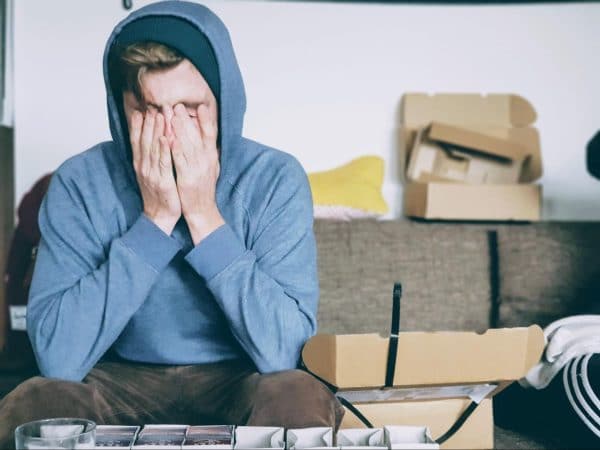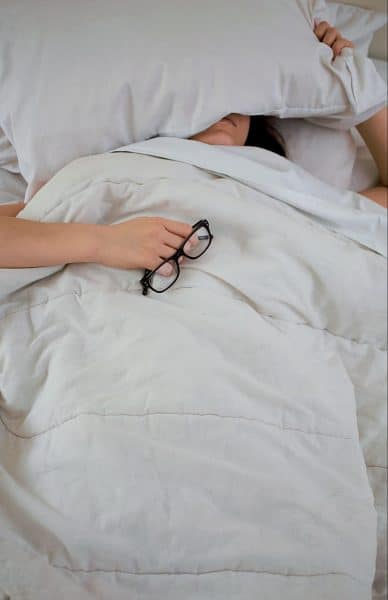Sleep and Stress:
What's the Connection?
The Daily Doze
Feeling perpetually tired in the morning and restless at night? You are not alone. In the past years, Americans have experienced elevated levels of stress compared to years past. According to the American Psychological Association’s Stress in America 2020 survey, respondents report 5.4 out of 10 in stress -- a 0.5 increase since last year and the highest average stress levels since the study launched in 2007.
There are many life stressors that trigger stress and anxiety: work, relationships, finances, parenting, traffic jams, mortgage payments, and COVID-19 related issues. Stress is a physical and emotional reaction to life’s challenges. Feeling stressed at times is normal and in the right amount, can even be helpful. If we’re in danger or need an extra push of motivation, stress can activate the body and prepare us for action when it’s most needed.
If stress is becoming severe and chronic, stress can result in burnout and your health can be adversely affected. In addition, the body’s response to stress is a vital survival mechanism and can negatively impact in multitudes of ways with long-term consequences. Therefore, it’s important to manage stress to manage your life and health optimally.
...Which Comes First?
So let’s ask the classic chicken-and-egg question: is stress the cause of poor sleep, or is it poor sleep that adds to one’s stress levels?
Latest sleep research has confirmed the relationship is two-way. Stress can affect the quality of sleep you have at night, and poor sleep can impact how you function emotionally, mentally, and physically. Thus, treating sleep problems without taking steps to manage anxiety and reduce stress is unlikely to have any real impact.
As sleep and stress have such a strong relationship, it’s essential to address both. Ignoring sleep problems can put you at higher risk for missing work or school, injuring yourself, and developing health conditions such as heart attack, shortness of breath, hypertension, stroke, and diabetes.

Moderate or acute stress is less likely to pose health risks -- but chronic stress can have a major and long-term impact on your body. Here are some signs that stress is already affecting your sleep health:
- Insomnia. People experiencing chronic and higher levels of stress are more likely to have more trouble falling asleep. Chronic insomnia can develop with prolonged stress.
- Bruxism. Teeth clenching and teeth grinding are other reported symptoms linked to chronic stress
- Sleep Disruptions. Stress can reduce REM sleep and increase nighttime awakening.
- Stress Dreams. The frequency of dreams is affected when feeling stressed -- with reduced dream experiences and severity of nightmares.
How to Improve Sleep and Manage Stress
Managing your stress -- and your sleep quality -- is a two-pronged strategy necessary to solving both.

- Pay attention to stress.
Know how to recognize stress: observe changes in sleep, thought patterns, and mood. Once you recognize these changes, you can make a plan on how to cope with stress.
- Improve daytime habits.
It may sound cliche, but these tips help: adopt a healthy lifestyle, eat a balanced diet, exercise regularly, and reduce stress in your day-to-day life. A healthy work-life balance will help you improve your sleep, and feel refreshed and energized the next day.
- Improve sleep hygiene.
Create a nightly routine. Maintain a consistent sleep schedule when you go to bed and wake up, even on weekends. Practice mindfulness techniques and meditation.
Also Read: How Sleep Affects Your Mental Health
Laying in bed and forcing yourself to sleep when you’re stressed out can be counterproductive. If you find yourself tossing and turning without a wink of sleep for more than 30 minutes, try to get up and do a relaxing activity: breathing exercises, meditate, or read a book.
You may be tempted to look at your phone or clock when you wake up in the middle of the night. It is strongly advised to avoid blue screen exposure to maintain sleepiness.
Finally, invest in the right sleep products! Most sleep problems are caused by the surface you lie on -- make sure you have the right amount of comfort and support needed. Make sure your back, head, and whole body is adequately supported.
Also Read: How Pressure Mapping Can Benefit Your Sleep
Learn More about Sleep
Knowledge is power. Learning more about better sleep will help you find and make the adjustments that will work for you. Check out our other blog posts to enrich your information on sleep:
Our Majestic Beds Team Sleep Experts would be more than happy to advise you about relieving pain or discomfort and getting a better night’s sleep. We can help you find the best solution to your sleep needs.
Sign Up for Exclusives and Updates
Invest in rest. A better sleep means a better life. To get the latest information on sleep science and other interesting info, click below to get notified about new blog updates!
